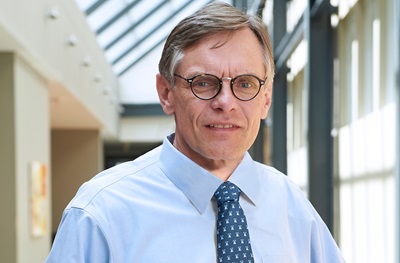
The internationally-renowned Gene Therapy Program at the University of Pennsylvania is joining the AAVCOVID vaccine program led by Massachusetts Eye and Ear and Massachusetts General Hospital (MGH), members of Mass General Brigham for the joint research program. AAVCOVID is a unique gene-based vaccine candidate designed to protect against SARS-CoV-2, the virus that causes COVID-19.
The AAVCOVID vaccine program was developed in the laboratory of Luk H. Vandenberghe, PhD, director of the Grousbeck Gene Therapy Center at Massachusetts Eye and Ear and Associate Professor of Ophthalmology at Harvard Medical School. AAVCOVID is a prophylactic gene-based immunization approach that uses an adeno-associated virus (AAV) vector to deliver and express gene fragments of SARS-CoV-2 virus to the body to elicit a protective immune response.
The AAVCOVID vaccine is currently in preclinical development with a plan to begin clinical testing in humans later this year. Mason Freeman, MD, director and founder of the MGH Translational Research Center and a Professor of Medicine at Harvard Medical School, is leading the efforts to develop the clinical studies intended to establish safety and efficacy of the experimental vaccine.
The AAVCOVID vaccine program will greatly benefit from the participation of Penn Medicine's Gene Therapy Program, led by gene transfer pioneer James M. Wilson, MD, PhD, as the Gene Therapy Program's involvement will enable the experimental vaccine to undergo additional rounds of critical preclinical studies that are required for the U.S. Food and Drug Administration investigational new drug (IND) application process.
"We are leveraging the enormous clinical experience of AAV for gene therapy in this vaccine application. The capsid selected for this project was discovered when Luk was a graduate student in my lab. It has the unique properties of activating immune responses, which is important for its use as a genetic vaccine, rather than suppressing immune responses which characterizes most capsids used for gene therapy. I am absolutely delighted to team up with Luk and Mason for this important project." says Dr. Wilson, who is the Rose H. Weiss Professor and Director of the Orphan Disease Center, and Professor of Medicine and Pediatrics at Penn's Perelman School of Medicine.
Under the direction of Dr. Wilson, the Gene Therapy Program currently employs over 280 full-time employees with operations supported by a diverse group of public and private sponsors.
"Dr. Wilson and his lab have made seminal contributions to the field of gene transfer for vaccines and therapy. The expertise and speed in pre-clinical development from this world-leading team joining the AAVCOVID project is a tremendous gain towards our ultimate goal of getting a vaccine into the clinic," says Dr. Vandenberghe. "We are grateful to the Gene Therapy Program at Penn Medicine and our collaborators in academia and industry for their shared commitment to battling the coronavirus pandemics."
About AAVCOVID Vaccine Program
The AAVCOVID vaccine program is a gene-based vaccine strategy that seeks to deliver genetic sequences of the SARS-CoV-2 using an AAV vector. Vaccination delivers genetic DNA fragments from SARS-CoV-2 which generates an antigen protein, which is designed to elicit an immune response to prevent infection. This approach is supported by extensive data demonstrating safety of the AAV technology platform in other diseases, including two FDA-approved medications.
The AAVCOVID project collaboration is led by principal investigator Dr. Vandenberghe, the Grousbeck Family Chair in Gene Therapy at Mass. Eye and Ear, who is a world-renowned leader and pioneer of viral gene transfer and therapeutic gene transfer. Dr. Vandenberghe and his laboratory began work on the vaccine in mid-January following the Wuhan outbreak and the first publication of genetic sequences of the new coronavirus. Using a specific AAV with desirable vaccine properties, the program seeks to induce immunity to prevent infection and disease in healthy populations, leveraging the existing manufacturing capabilities of the AAV industry.
Dr. Vandenberghe is working in conjunction with Dr. Freeman at MGH, who serves as Director of the Translational Medicine Group of the MGH Center for Computational and Integrative Biology and is Professor of Medicine at Harvard Medical School. The project aims to enter clinical trials in the second half of 2020.
AAV is also a rapidly adaptable technology. If a new strain of the SARS-CoV-2 virus emerges, the genetic code inside the AAVCOVID vaccine could be exchanged for an updated genetic code and processed into an new vaccine in weeks, according to the researchers.
About Massachusetts Eye and Ear






